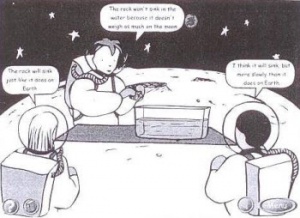Force: Difference between revisions
No edit summary |
No edit summary |
||
| Line 21: | Line 21: | ||
|strategy=in progress | |strategy=in progress | ||
|Learning Objectives= | |Learning Objectives= | ||
* | *Understanding progression for expectations of pupils' knowledge of 'force'. | ||
* | *Considering some possible stimulus materials for classroom discussion around 'force'. | ||
|additional resources= | |additional resources= | ||
|useful information= | |useful information= | ||
Revision as of 11:05, 10 December 2012
About. This resource explores the advancing expectations for pupils' understanding of 'force' as they move up the key stages, and some activities teachers could use as stimulus for classroom discussions.
Pedagogical content. This sessions engaged pupils in inquiry(ta) using the scientific method(ta) to explore force. It offers opportunity for teachers to use higher order questioning(ta), whole class assessment(ta) and to engage pupils in effective group work(ta) for investigation. (edit)
| Resource details | |
| Title | Force |
| Topic | [[Topics/Force|Force]] |
| Teaching approach | [[Teaching Approaches/Assessment|Assessment]], [[Teaching Approaches/In progress|In progress]], [[Teaching Approaches/Questioning|Questioning]], [[Teaching Approaches/Group work|Group work]], [[Teaching Approaches/Inquiry|Inquiry]], [[Teaching Approaches/Scientific method|Scientific method]] |
| Learning Objectives |
|
| Format / structure | A Word document (7 pages) including diagrams |
| Subject | [[Resources/Science|Science]] |
| Age of students / grade | [[Resources/Primary|Primary]], [[Resources/Higher|Higher]] |
| Table of contents |
|
| Related ORBIT Wiki Resources | |
| Files and resources to view and download |
|
| Acknowledgement | This resource was adapted from resources and original ideas contributed by Paul Warwick, at the Faculty of Education, University of Cambridge. |

